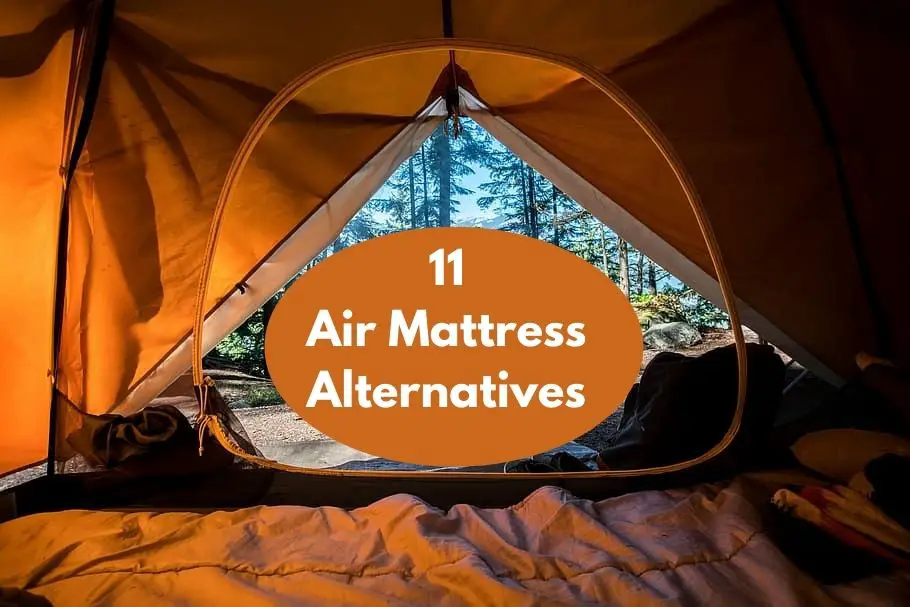If you’re looking for a comfortable air mattress alternative for camping or hosting guests, you’ve come to the right place!
In this guide, we will explore 10 different options for sleeping comfortably away from home.
Sometimes an air mattress can be a hassle, with the need for inflating and deflating it each time, plus the requirement to hook up your air mattress pump to an electrical source may not be an option.
Also, some larger campers may exceed the air mattress weight limit, or perhaps you may find it’s hard to find a tent that fits an air mattress.
Whether you are planning a camping trip or expecting guests over for the weekend, read on for some great ideas that will make everyone happy and well-rested.
Air Mattress Alternatives: 11 Best Options
Camping Cot
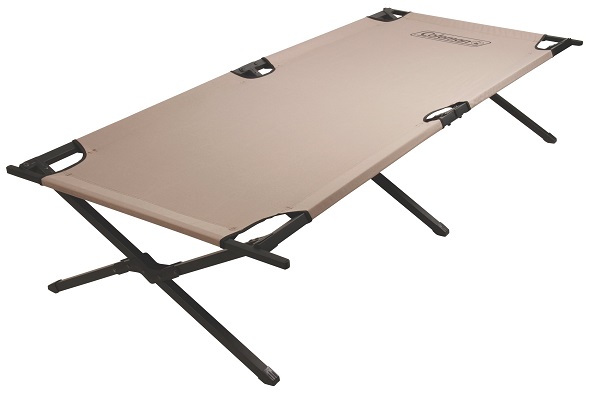
A camping cot is a great option for those who want something more substantial than an air mattress.
They are typically made of metal or nylon and fold up for easy transport and storage.
Comfort Level: Most camping cots are quite comfortable and provide a sturdy surface to sleep on.
The height of most cots can also be adjusted so you can find the perfect sleeping position.
Ease Of Use: Camping cots are very easy to set up and take down, which is great if you’re constantly on the move.
They’re also lightweight and some can be fully disassembled and reassembled later if needed, which is great for long-term storage.
Price: Camping cots can range in price from around $30 to $200.
The more expensive options tend to be made of higher-quality materials and have more features, such as storage pockets or an included mattress.
Pros: More comfortable than an air mattress, can be used indoors or outdoors, no need for an air pump.
Cons: Heavier and bulkier than an air mattress, not as portable, and narrower than most air mattresses.
Regular Cot
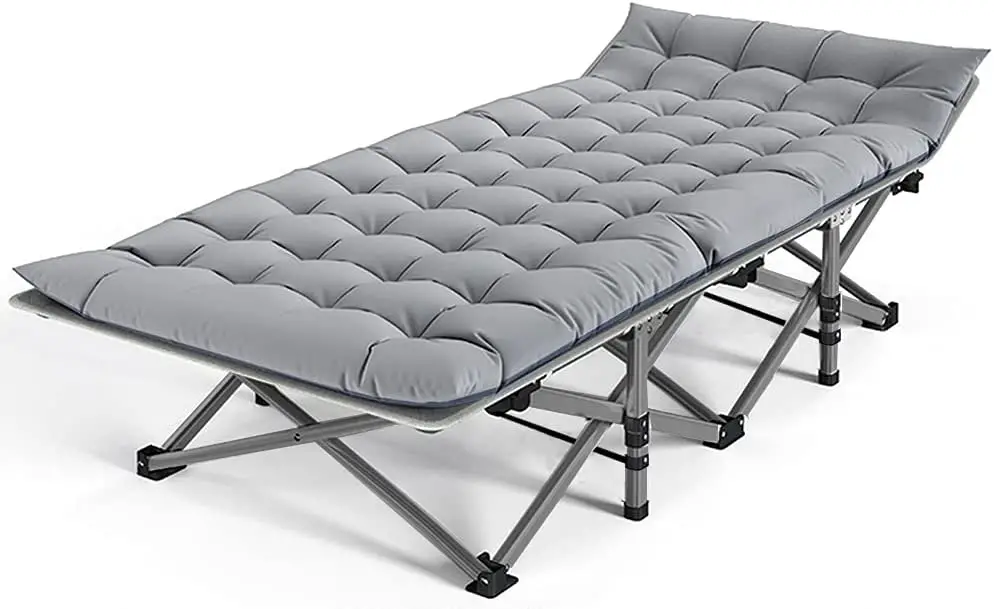
A regular cot is a very similar to a camping cot, but are usually a little higher off the ground and tend to be heavier.
This air mattress alternative feels very similar to the height of a normal bed, which is much better for guests or campers with mobility issues who may have trouble getting out of bed very close to the ground.
Comfort Level: A regular cot will be very comfortable, provided you have some additional padding on it like a comforter, blanket, or sleeping bag.
Ease Of Use: Most regular cots can be assembled in under a minute and also easily fold up for storage when not in use.
Price: Regular cots run anywhere from $80 to $300 depending on the model and features.
Pros: No air leaks to worry about, some models have extra padding, you have storage space beneath the cot, and less mobility issues since you’re higher off the ground.
Cons: Heavier to transport than an air mattress, not the best for cold weather camping due to lack of insulation, and the weight of heavier cots can damage tent floors.
Sleeping Bag
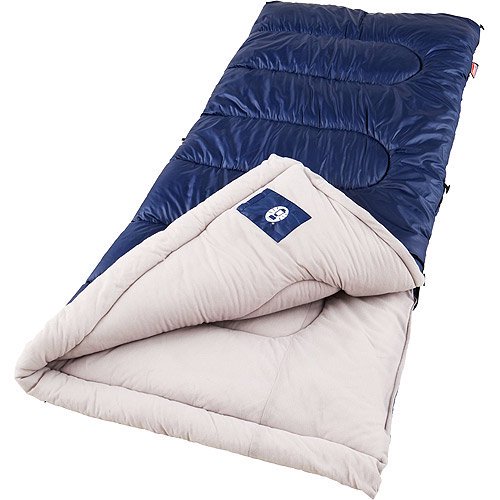
If you’re planning on doing some serious camping, then the trusty sleeping bag may be the best option for you and will be a great inflatable mattress alternative.
Sleeping bags come in all shapes and sizes, so you can find one that fits your needs.
They are also very lightweight and easy to carry, making them ideal for backpacking trips.
Comfort Level: Sleeping bags are designed for keeping you comfortable while camping in a tent or on nearly any hard surface, although they don’t have any “flex” in them like an air mattress or camping cot does.
While most folks sleep just fine in sleeping bags, make sure you take special care if you have special sleeping arrangement needs or have back problems.
Ease Of Use: Sleeping bags roll out and zip open/closed, and roll up when you’re done, making them extremely simple to operate.
Price: Sleeping bags are very affordable, starting at $25 and going into the hundreds for top-of-the-line models.
Pros: Authentic camping experience, lightweight and compact, no inflating or deflating required, relatively easy to care for.
Cons: Close to the ground, can be cold and quite firm if you’re not using a sleeping pad underneath your sleeping bag.
Folding Mattress
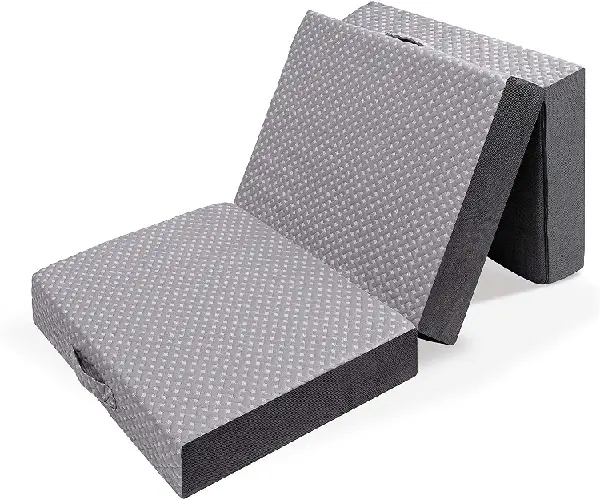
A folding mattress is a good alternative to an air mattress if you want something that is easy to set up and take down- as long as you have the storage space.
It simply folds in upon itself in two or three sections, kind of like those foam “kid couches” you may remember from your youth.
Comfort Level: These mattresses are usually very comfortable, featuring a 4-6″ thick foam construction which provides some flexibility and support.
Ease Of Use: Folding mattresses literally fold open and closed, making them a cinch to set up. However, due to their weight and bulk, they are a better choice for house guests than they are for camping, but will work for either as long as you’ve got the space.
Price: Folding mattresses usually range between $75-$250, making them reasonably affordable.
Pros: quick setup: just fold or unfold, no air leaks, thick and comfy just like a regular mattress.
Cons: typically only wide enough for one person, a bit bulky for transporting or storing.
Futon
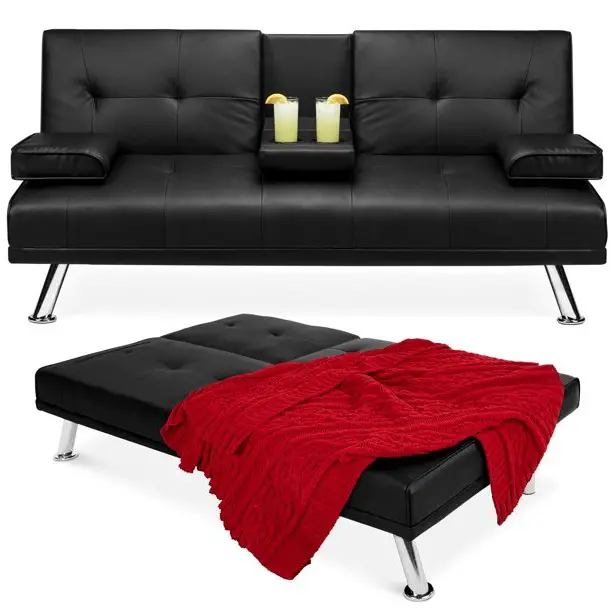
A futon is a great option if you need something that is versatile and can be used as both a bed and a couch, making it a top choice for air mattress alternatives for guests.
Futons are typically quite comfortable, and they offer a lot of space for sleeping. However, they can be difficult to move around because of the frame and bulky mattress, and may not be ideal for camping trips.
Comfort Level: Futons are very comfortable, often featuring thick pads that are both comfortable to sit and sleep on. The frame also provides a bit of flexibility and is more comfortable than sleeping directly on the ground.
Ease Of Use: Futons are very easy to convert from the couch to bed position, but transporting them is cumbersome due to their size and weight.
We would not recommend using a futon for camping, but they are great to stick in a spare room for overnight guests.
You could use the futon’s pad only for a sleeping pad in your tent if you wanted, although they aren’t super easy to transport and can be heavy – your call.
Price: Futons can run about $400-750 for the cost of both the frame and mattress pad.
Pros: Comfortable, warm, and highly durable. Easy to set up, and works as functional furniture.
Cons: Pricier than other options on this list, also heavy and bulky to move.
Bean Bag Chair
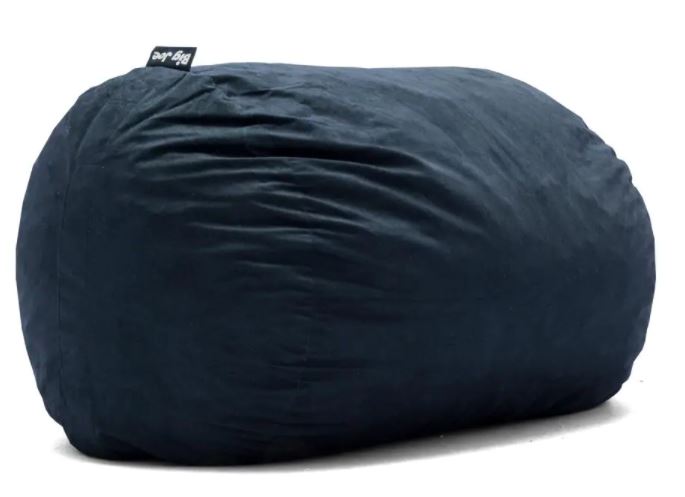
A bean bag chair may not seem like the most obvious choice for sleeping, but it can actually be quite comfortable.
Bean bag chairs are great for lounging and watching TV, and they can also be used as a bed.
They are usually very lightweight and easy to move, making them ideal for small indoor spaces.
Comfort Level: Bean bag chairs are very comfortable, with tons of little foam balls inside that provide a bit of support while feeling very cushioned and hugging your body, making them great for lounging on or sleeping.
Ease Of Use: There is nothing to set up with a bean bag chair – it’s a big orb, and you place it in the space you want to use. It’s that simple!
It’s not the best choice for camping due to it’s size and they can be a little awkward to carry, so it’s best to save this option for your house guests.
Price: Bean bags vary wildly in cost, from as little as $25 up to $200 for a top-tier model.
Pros: Easy to set up, comfortable, can be used as a chair and a bed.
Cons: Can be heavy and awkward to move, take up plenty of space because they don’t deflate or break down.
Hammock
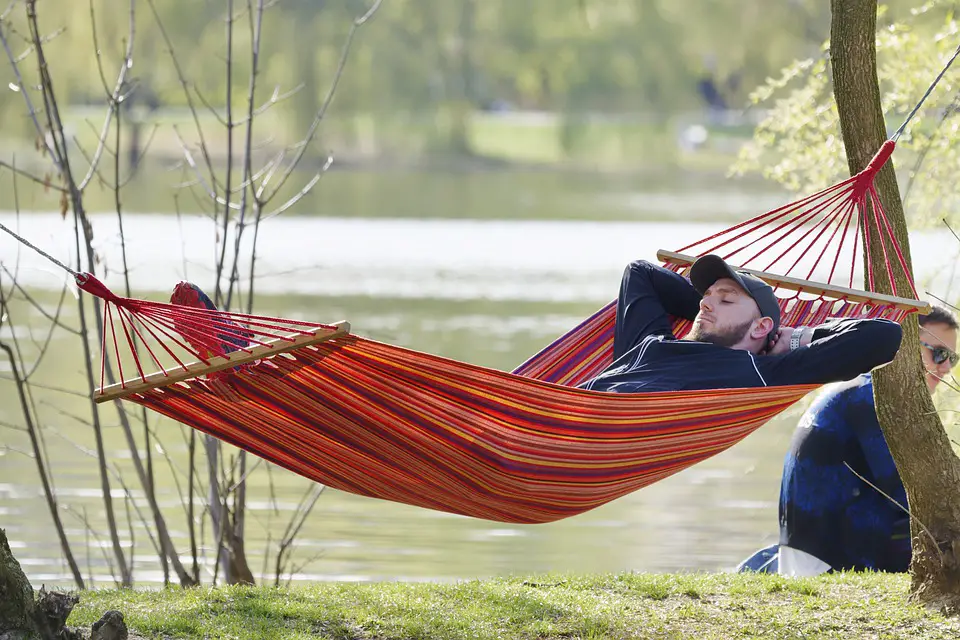
Hammocks are a great option if you want to sleep outdoors, and they offer a comfortable place to sleep off the ground.
However, hammocks can be difficult to use in colder weather, so they may not be the best alternative to a blow up mattress for winter camping trips.
Comfort Level: Hammocks are extremely comfortable, with many people finding that they sleep better in a hammock than in a bed.
The rocking motion is also very soothing and can help you fall asleep quickly.
Ease Of Use: Hammocks are easy to set up, but you will need two trees or posts to do so. They can also be tricky to get into if you’re not used to them, but once you get the hang of it they’re a breeze.
Price: Hammocks typically cost between $30-$60, making them a more affordable option than some of the other choices on this list.
Pros: Comfortable, easy to set up, portable.
Cons: Not ideal for colder weather, can be tricky to get into.
Mattress Pad
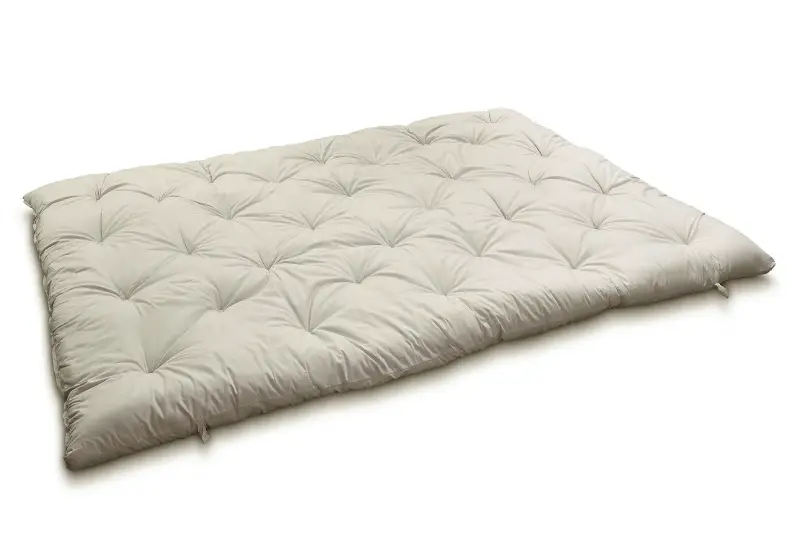
A mattress pad is a great way to add extra comfort to any bed. Mattress pads are usually made of memory foam or down, and they can be used on any type of mattress.
They are easy to set up and take down, and they offer a lot of extra cushioning.
Comfort Level: Mattress pads are very comfortable, and they can be used to make any bed or camping setup more comfortable.
Many offer memory foam or other extremely cushioned materials.
Ease Of Use: Mattress pads are very easy to use – you simply place them on top of your sleeping area and they’re ready to go.
They typically roll up for compact storage when you don’t need them.
Price: Mattress pads vary in price depending on the size and material, but they typically cost between $40-$250.
Pros: Easy to set up, comfortable, can be used on any type of mattress or with other camping gear like a sleeping bag.
Cons: Can be expensive, may not offer enough support for some people, can get dirty if used for camping.
Self-Inflating Sleeping Pad
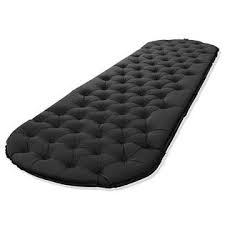
A self-inflating sleeping pad is a good option if you want something that is easy to set up and take down.
These pads are usually filled with air and can be inflated in just a few minutes.
Comfort Level: Self-inflating sleeping pads are like a very thin air mattress and are quite comfortable, although they may not be as cushioned as some of the other options on this list.
So essentially this air mattress alternative is a thin, scaled-down inflatable mattress.
They’re best used in conjunction with something else like a sleeping bag or blankets.
Ease Of Use: Self-inflating sleeping pads are very easy to use – you simply unroll them and let the air do its work.
They typically have a valve that you open to let the air in, and then close when it’s time to deflate the pad.
They store up very thin and compact, making them great for camping or home use.
Price: Self-inflating sleeping pads vary in price depending on the size and material, but they typically cost between $30-$100.
Pros: Easy to set up, comfortable, pack up compactly for camping and backpacking, can be used on any type of ground or with other camping gear like a sleeping bag.
Cons: Can be slightly expensive, limited use cases.
Blankets & Comforters
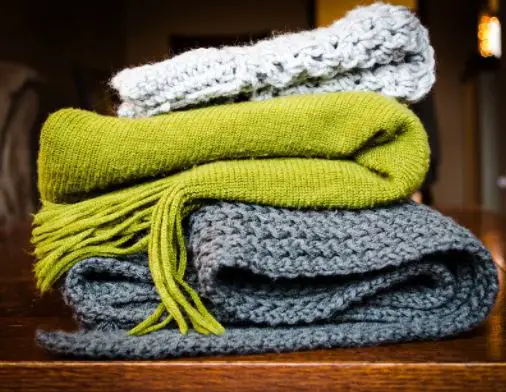
Blankets and comforters are a great way to add extra warmth and comfort to any bed, and it’s something you’ll definitely have on hand, making them a goodair mattress alternative for camping or home use.
They are usually made of cotton or wool, and they can be used on their own or in addition to any of the other options we listed in this guide.
Comfort Level: Blankets and comforters are very comfortable, and they can be used to make any bed or camping setup more comfortable.
You can also use them on their own to make a DIY camping bed.
They typically offer a lot of warmth and insulation, and a decent amount of padding.
Ease Of Use: Blankets and comforters are very easy to use – you simply place them where you want, layer them as needed, and you’re done!
When it’s time to pack up or clean up, just fold them up.
Blankets and covers come in a wide variety of sizes, so you can always find one that fits your needs (or your tent size).
Price: You likely already have some at home, so it’s technically free.
Blankets and comforters vary in price depending on the size and material, but they typically cost between $30-$200.
Pros: Easy to set up, comfortable, can be used on any type of mattress or with other camping gear like a sleeping bag.
Cons: May get dirty if used in a tent, a little bulky when folded up, and don’t provide any elevation off the ground.
Sleeping In Your Car
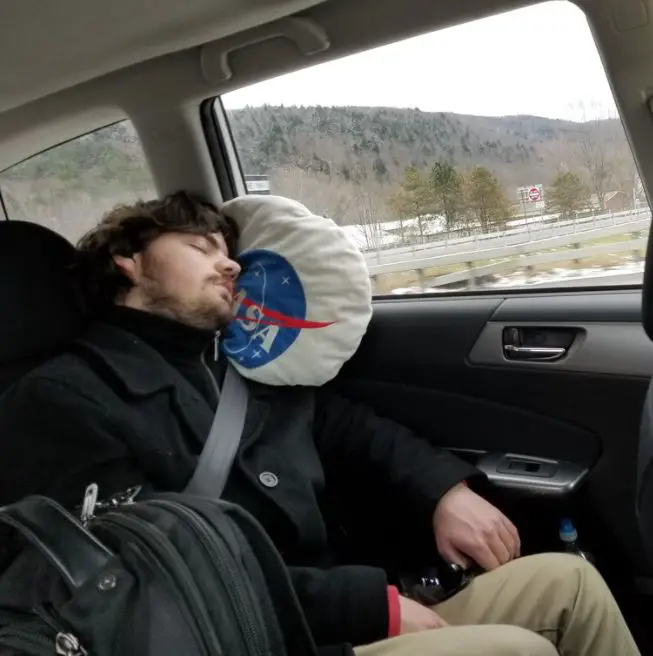
Depending on the model of your vehicle or how extenuating the circumstances are, you may opt to sleep in your car.
This all depends on if you plan on making a bed in the back of a flat area like a minivan or truck bed, or if you plan on reclining the front seats back as far as possible and trying to get some rest.
Comfort Level: If you’re sleeping in the front seat of your car, most seats don’t recline flat, so you’re going to feel a little stuck… especially if you’re a side sleeper or someone who sleeps on their belly, as those aren’t really feasible when sleeping in your car’s seat.
If you’re sleeping in the back of your car on a flat spot, that’ll offer a little more flexibility and you’ll have protection from bugs and the elements, but it’s still not soft.
You’ll need a sleeping pad, mattress pad, sleeping bag, or some blankets to cushion everything.
Ease Of Use: Besides setting up some blankets or pads, this is pretty straightforward: you get in your car, lie down, and go to sleep!
Price: Assuming you’ve got some blankets, one big advantage of sleeping in your car is that it’s absolutely free!
Pros: Safer than a tent, sturdy and weatherproof, doors lock.
Cons: Can be uncomfortable and cramped, not much space to spread out.
Air Mattress Alternative Options: Wrapping Things Up
There you have it! These are 11 different air mattress alternatives that will help you get a good night’s sleep while camping or hosting guests.
What’s your favorite alternative to an air mattress for camping or having overnight guests? Let us know in the comments below.
Be sure to check out our other helpful camping guides while you’re here:
- The best camping water containers
- The best camping string lights
- How to lock a tent
- What is a tent vestibule?
- The best campfire cooking kit options
- How long does wood take to dry after rain?
- How long does Jetboil fuel last?
- The best heated camping chairs
- Our guide to cowboy camping
- The best camping shovels
- How long does wood take to dry after rain?
- What wood is toxic to burn?

